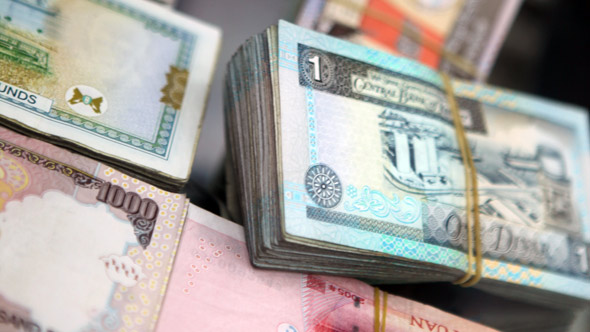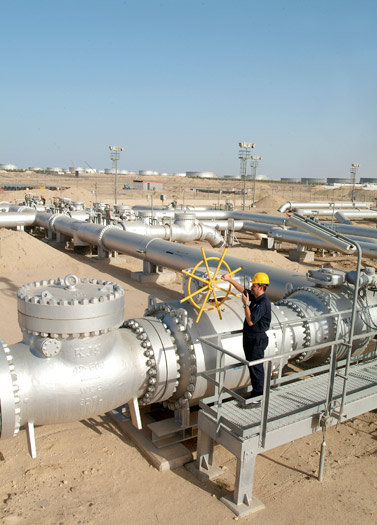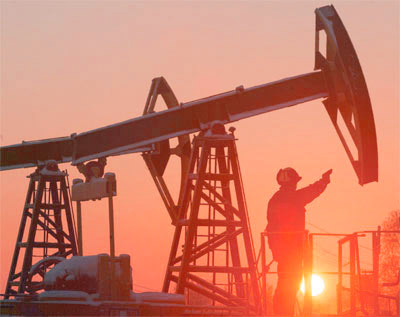Economy 2012: Overview of Kuwait’s Economy 2012
Kuwait’s national budget relies 95 percent on oil revenues, but the public and the private sector join forces to push for more diversification.

Kuwait’s Economy: Kuwait Says Farewell to the One-Basket Economy. Kuwait’s national budget relies 95% on oil revenues, but the public and private sectors join forces to push for more diversification
You want to understand the importance of oil in Kuwait? Take a simple comparison: The small state of Kuwait, whose borders can be driven along by car within an hour, produces more oil per day than Algeria and Indonesia together.
With oil prices trading above 90 U. S. dollars (U. S. crude) for more than half a year, financing issues are not a big deal in Kuwait. The International Monetary Fund (IMF) estimates that Kuwait total government gross debt will be 4.4% in 2012, the second lowest rate among all MENA oil exporters (behind Oman with 3.2%).
With oil prices trading above 90 U.S. dollars (U.S. crude) for more than half a year, financial issues are not a big deal in Kuwait. The International Monetary Fund (IMF) estimates that Kuwait total government gross debt will be 4.4% in 2012, the second lowest rate among all MENA oil exporters (behind Oman with 3.2%).
According to a report by Global Investment House, “As expected, oil continued to dominate total exports of Kuwait in 9M2011, as it did with total government revenues. On average, oil exports have accounted for 94% of total exports from 2005 to 9M-11. Since 2003, oil prices have witnessed rapid growth which enabled Kuwait to reach high level of exports during that time.”
Pessimism despite petrol wealth
The average man on the street in Greece must be more than confused as to why even Kuwaitis demonstrate against the state, where citizens neither pay for a doctor’s visit nor make a domestic phone call. 
The country’s blessing with oil is its power and its vulnerability at the same time. When the northern Gulf state celebrated the 50th year anniversary of its independence in 2011, critical voices about the one-sided economy and its complex constitutional system overshadowed the happiness.
In an exclusive interview with Marcopolis, Kuwait’s former Minister of Finance Bader Al Humaidhi makes no secret of his pessimism. “Although right now Kuwait is flourishing with higher prices of oil, I am not very optimistic about the country’s future. That is mainly because we have not yet diversified our sources of income, besides the oil industry.”
Al Humaidhi adds, “We have not yet implemented the five-year development plan as we were supposed to do.”
In 2010, the Kuwaiti Parliament unanimously approved 104 billion U.S. dollars to the five-year development plan. The plan has one mission: to diversify the economy away from hydrocarbons.
While Kuwait would have no financing problems with investment grade rating AA-/A-1+ (Standard and Poor’s), the problem Al Humaidhi identified is less about a lack of funds but about the skewed allocation of the current funds.
But Kuwait is far from becoming a second Dubai, which has built up 20 free zones for various industry sectors since the beginning of the new millennium.
Al Humaidhi explains what goes wrong in his country. “Our budget for this year is at approximately $92 billion, but the price of oil is at $107 or $108 per barrel. The government has been able to collect only KD 18.7 billion to date. Maybe in the next three months (which is the remainder of the financial year) we might reach KD 23 or KD 24 billion, but how much do we have to spend? Do we really need to spend KD 20 billion?”
While Kuwait would have no financing problems with investment grade rating AA-/A-1+ (Standard and Poor’s), the problem Al Humaidhi identified is less about a lack of funds and more about the skewed allocation of current funds.
“Four-fifths of the budget goes to pay for salaries and wages, these expenditures are unproductive. Only around 13% of the budges goes to investment and capital project. In all truth, it is a bleak future. “
Arab Spring a wake up call?
These particular imbalances have triggered the public outrage in the wake of the Tahrir revolt. Motivated by revolutions in Tunisia and Egypt, thousands of frustrated demonstrators filled the streets of Kuwait City in spring 2011, demanding political reforms from the ruling Al-Sabah family.
“Don’t put all your eggs in one basket,” an old trader’s saying states. For Michel Accad, CEO Gulf Bank, there is more than one basket called “oil industry” in the northern Gulf state.
“There are plenty of sectors, from the retail sector to the contracting sector to trade & finance – Kuwait is still a large importing country,” Accad said. Like all Gulf Arab states, Kuwait has to import nine tenths of its food needs. The dry-hot desert climate does not allow mass cultivation or extensive agriculture like in Algeria, Sudan or Lebanon.
Accad thought of pushing tourism in Kuwait, as well as trade, logistics, media and education. Kuwait is currently building a container port on Boubyan Island in the Gulf. The port could serve not only the Arabian Peninsula but also neighboring Iraq with its 30.3 million inhabitants.
“There are a lot of opportunities outside traditional areas. The problem is there isn’t much activity within these other areas right now.”
Al Humaidhi said, “We have a free press and a free media, as well as a parliament. We are a democracy, after all. If we take the examples of such countries such as Egypt, Libya, and Syria, they do not have the benefits that we have.”
But there are missing gaps, as Al Humaidhi added: “Kuwaiti investments are mostly in the US T-bills, EU government bonds. What if the market goes down or even collapses?”
Dr. Nasser Saidi, Chief Economist at the Dubai International Financial Center (DIFC) Authority, has been lobbying for many years for a local bond market. Dr. Saidi, who was considered among the 50 most influential Arabs by The Middle East Magazine in 2009 and 2010, said in a conference on MENA infrastructure on March 27 2011, “Gulf Arab economies are in urgent need to develop a local currency bond market to attract local institutional and retail capital for infrastructure and housing finance.”
So far the local Gulf Arab debt market has an insignificant share of total project financing as the bulk of financing is done through direct loans from the banks. “A vibrant debt local market is key to raising local funds and increasing infrastructure spending, to create jobs for the overall young and fast growing population in the Gulf, and for attracting foreign direct investments.”
Al Humaidhi agreed with Dr. Saidi in this point: “In the next ten years, we will have 350,000 Kuwaiti seeking jobs. So if no jobs are found for those people, we will have a severe social problem in the future. When such conditions are met, my view might become more optimistic.”
. “Although right now